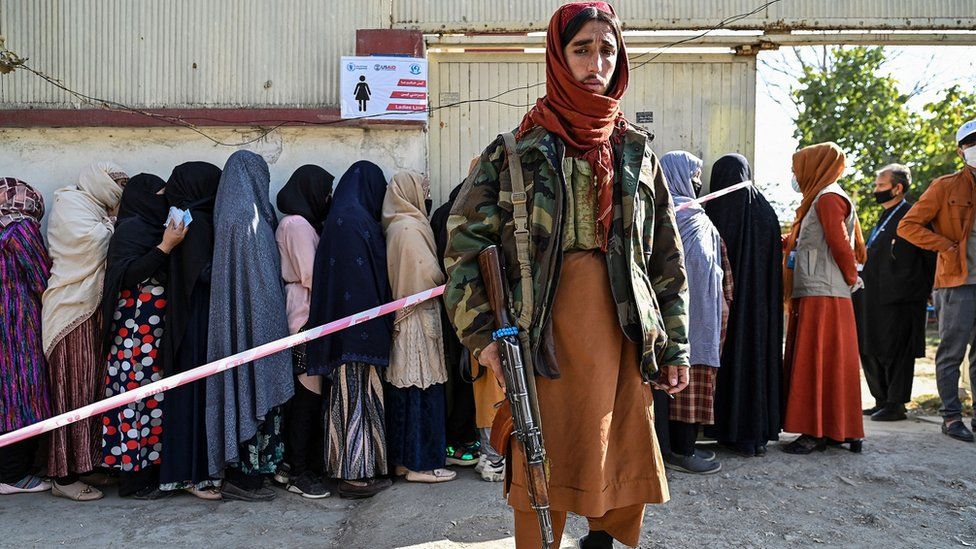This is a country that is starting to feel the genuine fear of hunger. The weather is turning from early autumn warmth to a sharp chill. Several areas are reporting drought, which adds to the sense of growing catastrophe.
At Maidan Wardak, 50 miles west of Kabul, a crowd of several hundred men had gathered in the hope of getting flour from an official distribution point. The World Food Programme provided the flour.
Taliban soldiers kept the crowd reasonably quiet, but people who were told they weren’t eligible for a hand-out were angry and frightened.
“The winter is nearly here,” said one old man. “I don’t know how I’ll get through it if I can’t make bread.”
The WFP is faced with raising its supplies to Afghanistan to help more than 22 million people.
If the weather is as bad as experts predict this winter, the expectation is that large numbers will be threatened with acute hunger and widespread famine. I spoke to the executive director of the WFP, David Beasley when he paid a visit to Kabul on Sunday.
His analysis of the situation was alarming.
“It is as bad as you possibly can imagine,” said Mr Beasley. “We’re now looking at the worst humanitarian crisis on Earth.
“Ninety-five per cent of the people don’t have enough food, and now we’re looking at 23 million people marching towards starvation,” he added. “The next six months are going to be catastrophic. It is going to be hell on Earth.”
Before the Taliban took power in Afghanistan in August, there was confidence that the government of President Ashraf Ghani would be able to cope with the threat of a bad winter, given the help of the international community. That help evaporated when Mr Ghani’s government collapsed.
But will those countries stand by now and allow millions of innocent people to face acute hunger?
Mr Beasley challenges the governments and the billionaires of the developed world to face the urgent need for help.

“To the world leaders, to the billionaires: imagine that this was your little girl or your little boy, or your grandchild about to starve to death,” he said. “You would do everything you possibly could, and when there’s $400 trillion worth of wealth on the earth today, shame on us.”
“We let any child die from hunger—shame on us. I don’t care where that child is,” he adds.
In the city of Bamiyan in central Afghanistan, wherein 2001, the Taliban destroyed the ancient and beautiful statues of the Buddha carved into the cliffside in the 6th Century. We went to meet a widow, Fatema, and her seven children aged from three to 16.
Under the last government, Fatema could get reasonably regular supplies of flour and oil, but those stopped directly the Taliban took over.
Fatema used to make a little money weeding the soil for a nearby farmer. Now, though, the drought afflicting this area means that fewer crops have survived, and there is no work for her.
“I’m frightened,” she says. “I’ve got nothing to give the children. Soon I’ll have to go out and beg.”
Some parents have sold their daughters off to older men in marriage. Fatema has refused to do that. But unless the supply of food resumes, she and her children face actual starvation.
The snow begins to settle on the nearby mountain-tops, and there is a new sharpness in the air.
The winter will very soon be here, and vast numbers of people like Fatema and her family will be on the very brink of catastrophe.
Source: BBC WORLD SERVICE


